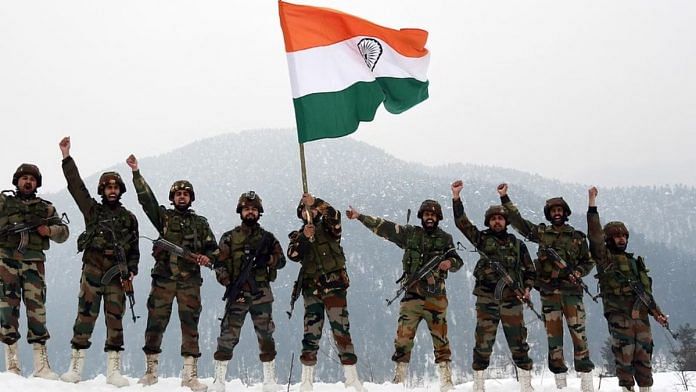One Thursday morning in November 2004, the telephone operator put through a call to the general and said, ‘Call for you, Sir, from some political person.’
Political person? The general wondered who this could be. He picked up the phone and identified himself. The person at the other end announced who he was and waited for the general’s reaction.
The general just said, ‘Good morning. What can I do for you?’
The voice at the other end of the line said, ‘Do you know who I am?’
The general answered, ‘You just told me who you are.’
The speaker didn’t seem to be too happy with the general’s response and said, ‘Have you heard of me before?’
The general truthfully said, ‘No.’
The political person handed the phone to one of his staff members, who said, ‘Sir, you were just speaking with the General Secretary of the National Party for Democracy. Would you like to meet him today at 11 a.m.?’
The general was beginning to get mystified. The person at the other end of the phone seemed to suggest that it was the general who wanted to see this political person, which was not the case, but it was possible that the person speaking to him at the moment could not express himself appropriately. The general, however, did not want to appear rude, so he said, ‘I do not know what this is all about. Does the General Secretary of the National Party of Democracy want to meet me?’
‘Yes, yes,’ the voice said. ‘At your office, at 11 a.m.’ That made the situation a little clearer.
The general checked the planner on his desk and it indicated that he was free that morning. However, he would need permission from the director of the NGO to meet with someone political on a matter that was not yet clear. The general said, ‘Please give me your contact number and I will call you back.’
After obtaining permission from the director to meet this person, the general rang back and said, ‘Yes, the appointment has been cleared for 11 a.m. Does the General Secretary have a bodyguard?’
‘Yes,’ replied the voice at the other end, and added very importantly, ‘Commandos! Black Cat Commandos! Four of them!’
The general was unimpressed and replied in a very matter-of-fact tone, ‘Well, he will have to leave the commandos in the parking area. We cannot have them inside this institute. We care for disabled children here, and they may possibly get alarmed with armed commandos
moving around with weapons.’
There was some muted conversation at the other end, after which the person agreed to leave the commandos in the car park.
The General Secretary of the National Party for Democracy arrived at the institute at precisely 11 a.m. He had three people with him other than the commandos, who were left outside. They were escorted to the general’s office by one of the security guards of the institute.
It was break time for the children and they were playing outside on the lawns. Contrary to the general’s fears, the children had eyes only for the commandos! They crowded around them and were happily asking them all sorts of questions. The commandos were equally happy to be with the children. It must have been a welcome change for them, considering the type of people they normally met in connection with their security duties.
The General Secretary was slim, trim and meticulously dressed. Unlike the general look of most politicians, he was dressed in a smart safari suit. He walked with a limp and carried an elegant silver-topped walking stick. He explained the limp by saying that there had been an attack on his life and he had been injured, hence the stick.
The general now remembered the man and the attack on his life because of a particularly gory newspaper photograph of a policeman carrying a head that had been severed from one of the victim’s bodies. The whole incident now came back to the general, as did the fact that the General Secretary was a brave man who had continued with his work despite the threat to his life. The general was now beginning to feel glad that he was meeting with this man, who was committed to his ideals and a cause larger than himself.
The general’s office was quite small, but he managed to fit the four of them in.
The General Secretary was very polite; he introduced himself and said that he had heard about the general and had even read and liked one of his books, Param Vir. He went on to say that he was there to personally invite the general to a function he was organizing at Vigyan Bhavan. The function was to honour people who had done something good for the nation in war and peace, and the general was one of them. There would be a group of eminent people on the dais to grace the occasion, and it would consist of ex-prime minister Narasimha Rao, the politician Amar Singh, film stars Amitabh and Jaya Bachchan, industrialist Anil Ambani and his wife Tina, the CEO of Sahara Airlines and some others. He added that he was there personally because the function was only a few days away and he
needed immediate confirmation from the general.
The general was more than a little mystified as to why, of all people, he wanted him to be there as well.
The General Secretary seemed to read the general’s thoughts and said, ‘I consider you to be a war hero, Sir, and would like to honour you, as well as some other service personnel and civilians who have done much for the country but have never been suitably rewarded.’
The general replied, ‘Soldiers do not look for rewards. All that we look forward to is the respect of the people of India for the work that we do to keep them safe.’
The General Secretary answered. ‘General, that is the problem with you soldiers. You make all the sacrifices but you do not look for rewards, and that is why you do not receive them. Your status, pensions and salaries are a case in point. I am trying to make up for this in my own way. As a member of Parliament, I receive a grant for the people of my constituency, and it is my endeavour to pick those who, in my opinion, have done something for the people of India, and this is my way of expressing the nation’s gratitude.’
 This excerpt from Ian Cardozo’s Beyond Fear has been published with permission from Penguin India.
This excerpt from Ian Cardozo’s Beyond Fear has been published with permission from Penguin India.



